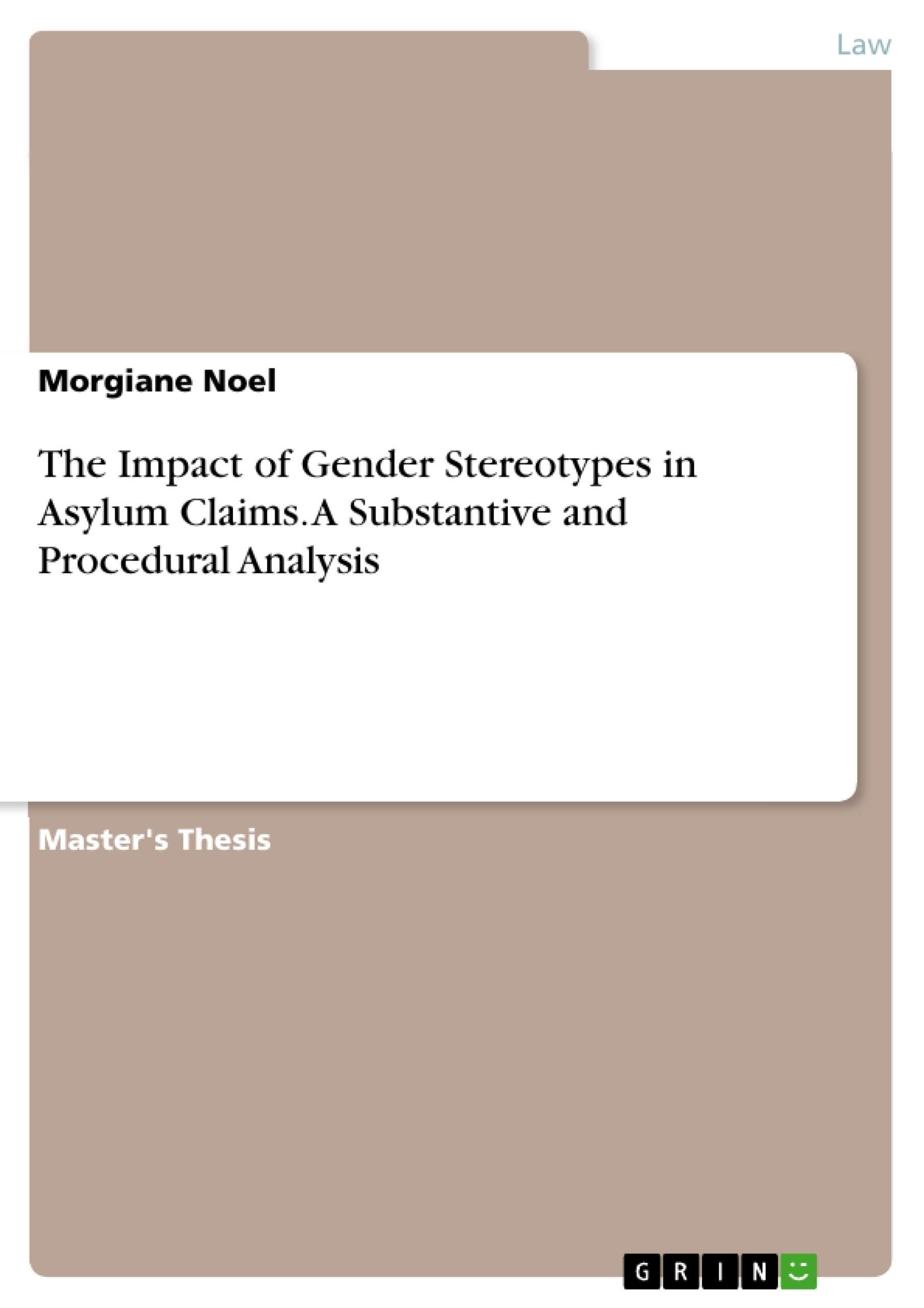This thesis aims to highlight the substantive and procedural gender-based obstacles faced by women asylum seekers in the context of refugee law. For Centuries, displacements of individuals have always been motivated by various reasons: social, cultural but also legal changes needed to be implemented to adapt to new displacements of people. For example, the ‘migration crisis’ of 2015 has challenged the EU Member States and European actors to adjust and implement new instruments. For years, the visibility of women in migrations has been becoming increasingly evident, deconstructing some of the established social and
cultural paradigms based on the roots of our societies. Solutions implemented by the EU Member States do not have to undermine the values of the European Union and drive its integration, such as solidarity, hospitality, and responsibility. Therefore, inclusiveness and change have to be included in legal instruments for better reception of current and future displacements of people.
Inhaltsverzeichnis (Table of Contents)
- Introduction
- Chapter 1: Gender Stereotypes and their Impact on Refugee Law
- 1.1. The Concept of Gender Stereotypes
- 1.2. Gender Stereotypes and their Intersectionality
- 1.3. Impact on Asylum Claims
- Chapter 2: Substantive Analysis of Gender Stereotypes in Asylum Claims
- 2.1. The Refugee Convention and Gender-Based Persecution
- 2.2. The Role of the UNHCR Guidelines
- 2.3. Case Law Analysis: Challenges and Advancements
- Chapter 3: Procedural Analysis of Gender Stereotypes in Asylum Claims
- 3.1. Challenges in Establishing Credibility
- 3.2. The Role of Interpreters and Cultural Sensitivity
- 3.3. The Importance of Legal Representation
- Chapter 4: Recommendations for Addressing Gender Stereotypes in Asylum Procedures
- 4.1. Training and Awareness-Raising for Asylum Officials
- 4.2. Strengthening the Role of the UNHCR
- 4.3. Enhancing Legal Representation for Asylum Seekers
- Conclusion
Zielsetzung und Themenschwerpunkte (Objectives and Key Themes)
This dissertation examines the impact of gender stereotypes on asylum claims, focusing on both substantive and procedural aspects of refugee law. The aim is to shed light on the unique challenges faced by women asylum seekers and to explore ways to mitigate the negative consequences of gender biases in asylum processes.- The role of gender stereotypes in shaping asylum claims and decision-making
- The impact of gender stereotypes on women's credibility and access to protection
- The need for a gender-sensitive approach to asylum procedures
- Recommendations for improving the recognition and protection of women asylum seekers
- The importance of intersectionality in understanding the experiences of women asylum seekers
Zusammenfassung der Kapitel (Chapter Summaries)
- Chapter 1: Gender Stereotypes and their Impact on Refugee Law: This chapter provides an overview of the concept of gender stereotypes and explores their intersectionality with other forms of discrimination. It also examines the impact of these stereotypes on asylum claims, highlighting the particular challenges faced by women asylum seekers.
- Chapter 2: Substantive Analysis of Gender Stereotypes in Asylum Claims: This chapter delves into the substantive aspects of refugee law, exploring the Refugee Convention and the role of the UNHCR guidelines in addressing gender-based persecution. It analyzes relevant case law, highlighting both challenges and advancements in the recognition of gender-based claims.
- Chapter 3: Procedural Analysis of Gender Stereotypes in Asylum Claims: This chapter focuses on the procedural aspects of asylum claims, examining the challenges faced by women in establishing credibility and navigating the asylum process. It also discusses the importance of cultural sensitivity, the role of interpreters, and the need for adequate legal representation.
- Chapter 4: Recommendations for Addressing Gender Stereotypes in Asylum Procedures: This chapter provides practical recommendations for addressing the issues raised in previous chapters. It proposes strategies to improve training for asylum officials, strengthen the role of the UNHCR, and enhance legal representation for asylum seekers.
Schlüsselwörter (Keywords)
This dissertation centers around key concepts of gender stereotypes, refugee law, asylum claims, gender-based persecution, credibility, legal representation, and intersectionality. It examines the implications of these concepts for women asylum seekers and seeks to promote a more gender-sensitive approach to asylum procedures.Frequently Asked Questions
How do gender stereotypes affect asylum claims?
Gender stereotypes can lead to biases in evaluating the credibility of women asylum seekers and may result in the failure to recognize gender-based persecution as a valid ground for refugee status.
What is gender-based persecution?
It refers to persecution that targets individuals based on their gender or sexual orientation, including domestic violence, female genital mutilation, and forced marriage.
What role does the UNHCR play in gender-sensitive asylum procedures?
The UNHCR provides guidelines that help member states interpret the Refugee Convention in a way that includes and protects victims of gender-based violence.
Why is intersectionality important in refugee law?
Intersectionality helps understand how different forms of discrimination (e.g., race, gender, class) overlap and create unique obstacles for women seeking international protection.
What are the procedural challenges for women in the asylum process?
Challenges include a lack of cultural sensitivity among officials, difficulties in establishing credibility due to trauma, and insufficient access to specialized legal representation.
- Quote paper
- Morgiane Noel (Author), The Impact of Gender Stereotypes in Asylum Claims. A Substantive and Procedural Analysis, Munich, GRIN Verlag, https://www.grin.com/document/1289751



